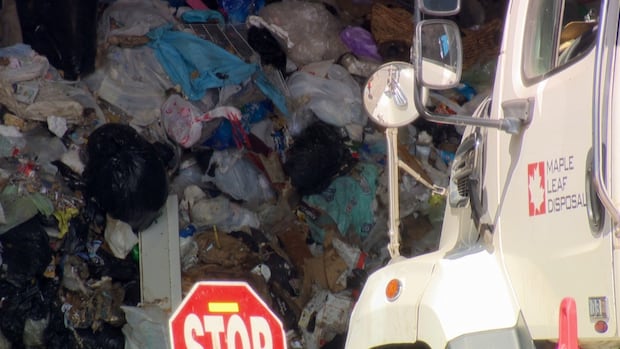For 10 years, organic waste has been banned from Metro Vancouver landfills, but the materials—things like food scraps which can be composted — are still the most common single item ending up there.
It’s a waste conundrum for the region, which prides itself on resident and business know-how in reducing waste and keeping materials from ending up in landfills.
“When organics end up in the garbage and they can end up in the landfill, they produce methane, which is a powerful greenhouse gas,” said Terry Fulton, Metro Vancouver’s senior project engineer.
Conversely, if organics are properly diverted, it’s a straightforward process to turn them into a soil amendment.
“Which is a valuable product that actually helps build healthy soils.”
Compost bins are pictured at Cedarwood Place in Richmond, B.C., on Aug. 26, 2025. (Ethan Cairns/CBC)
Since 1997, Metro Vancouver has been banning items from its solid waste facilities that are “readily recyclable,” with food scraps added in 2015.
Fulton said many people and businesses do the right thing by having compost bins and systems in place to have the materials diverted and composted, but the latest Metro Vancouver waste composition shows that 22 per cent of regional waste was compostable organics, the most common single item, ahead of plastic, which comprises 19 per cent of regional waste.
In 2024, an average of 70 kilograms of compostable organic materials per person ended up in the garbage.
That’s down from the 87 kilograms per capita of compostable organics in the garbage in 2021, when they made up 28 per cent of regional waste.
Officials like Fulton are commending residents and businesses for their efforts to slowly reduce the amount of organic waste showing up in landfills.
“But there’s still work to be done,” said Fulton. “We see some sectors where there’s more challenges than others.”
One of the biggest areas for improvement is multi-family buildings. A separate waste composition study in 2024 by Metro Vancouver showed that 32 per cent of waste coming from the buildings was compostable organics.
Smaller spaces, smell, and ickiness are all reasons why residents in these buildings have a higher rate of organic waste in their garbage compared to the regional average.
Cristy Houston, the City of Richmond’s waste reduction and recycling co-ordinator, says a big part of her job is providing tools and information to residents in multi-family buildings to divert more organic waste.
“I think of a lack of convenience … the distance between where you may be sorting your materials and where they’re actually ending up within your building can contribute to why it might be easier to do things incorrectly,” she said.
“But the opportunity to sort and create that space within your multifamily building to make sure you’re sorting things is something that’s readily available to all residents.”
Cristy Houston, the City of Richmond’s waste reduction and recycling co-ordinator, says the city provides tools such as recycling bins and bags along with information to try to help reduce the amount of organic materials ending up in the landfill. (Ethan Cairns/CBC News)
There are buildings overcoming these hurdles and doing a great job, according to both Houston and Fulton.
One is Cedarwood Place in Richmond, which is a 72-unit complex that houses seniors. It has multiple recycling and compost bins outside in a central location with clear signage showing what is accepted or not.
Resident Maria Bianchi said people at the complex make an effort to make sure their green materials don’t end up in the garbage, even if it’s not a perfect system.
“Yes, except I do think the green bin stinks a hell of a lot,” she said.
Penalties and incentives
Metro Vancouver has been running a “food scraps aren’t garbage” campaign for years in hopes of pushing people to do the right thing.
A surcharge of 50 per cent of the tipping fee is applied to haulers who bring loads containing 25 per cent of visible organics to solid waste facilities in Metro Vancouver.
That, along with the public campaign, has brought improvements in diversion rates, but after 10 years of an organics ban, it’s unclear how much further it will improve or by how much it should.
The current diversion rate in Metro Vancouver for all waste is 65 per cent, with a goal to hit 80 per cent, said Fulton. That could change, however, as Metro Vancouver is currently updating its solid waste management plan and seeking public input.
Jiaying Zhao, with UBC’s Centre of Psychology and Sustainability, studies behaviours around waste reduction and recycling and has worked with Metro Vancouver on its organics problem.
She lives in a multi-family building and freezes her compost and then takes it down to her building’s waste room once it’s full to avoid any unsavouriness.
She says Metro Vancouver could be more direct about the major consequence of not diverting green waste, namely that the methane it produces is far more potent to the atmosphere than carbon dioxide.
“So you want to outline the consequences of not composting food waste, but at the same time you also want to highlight any incentives, any benefits of composting, like if you compost your food … this turns into soil and that grows our food.”

